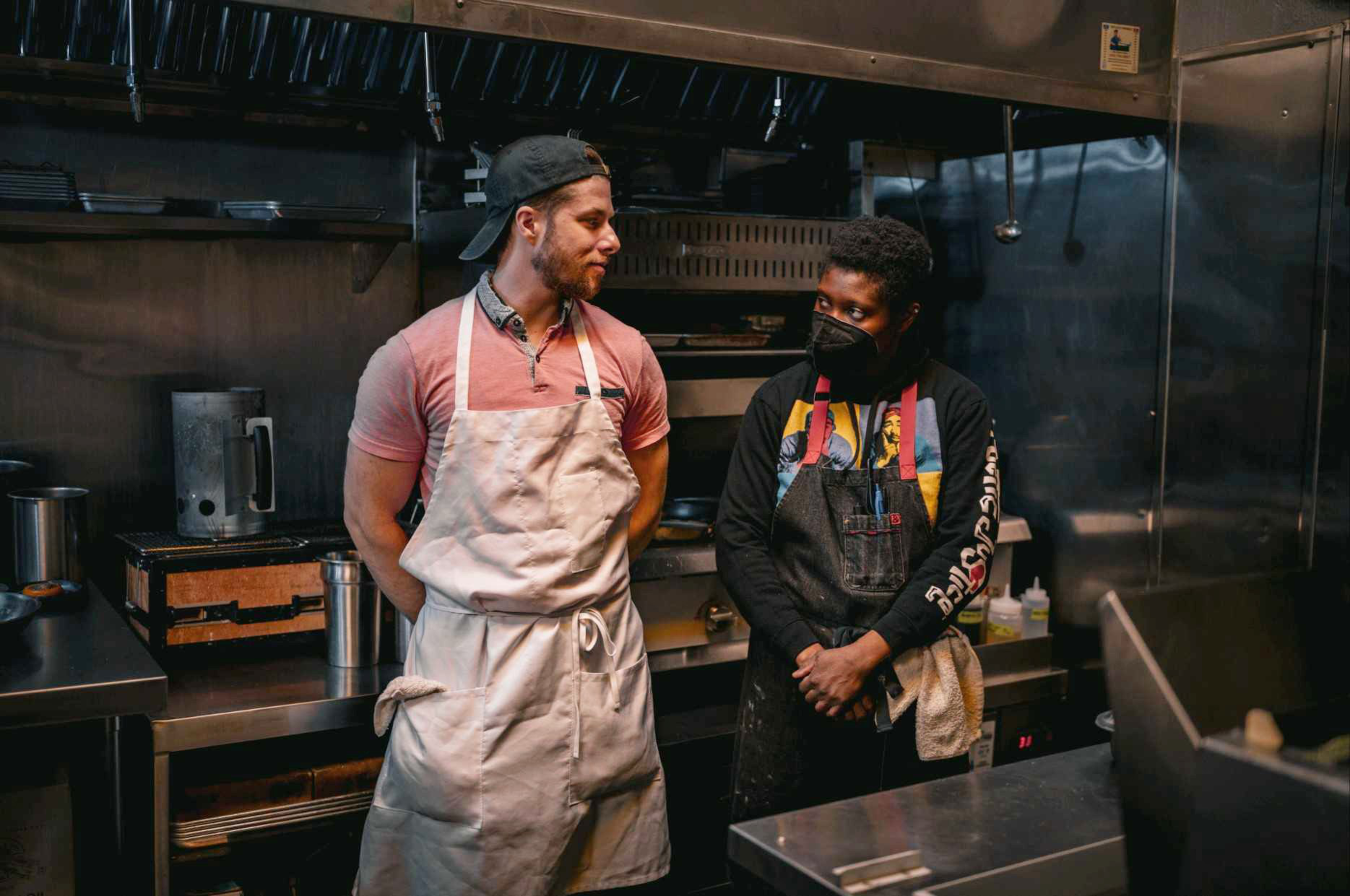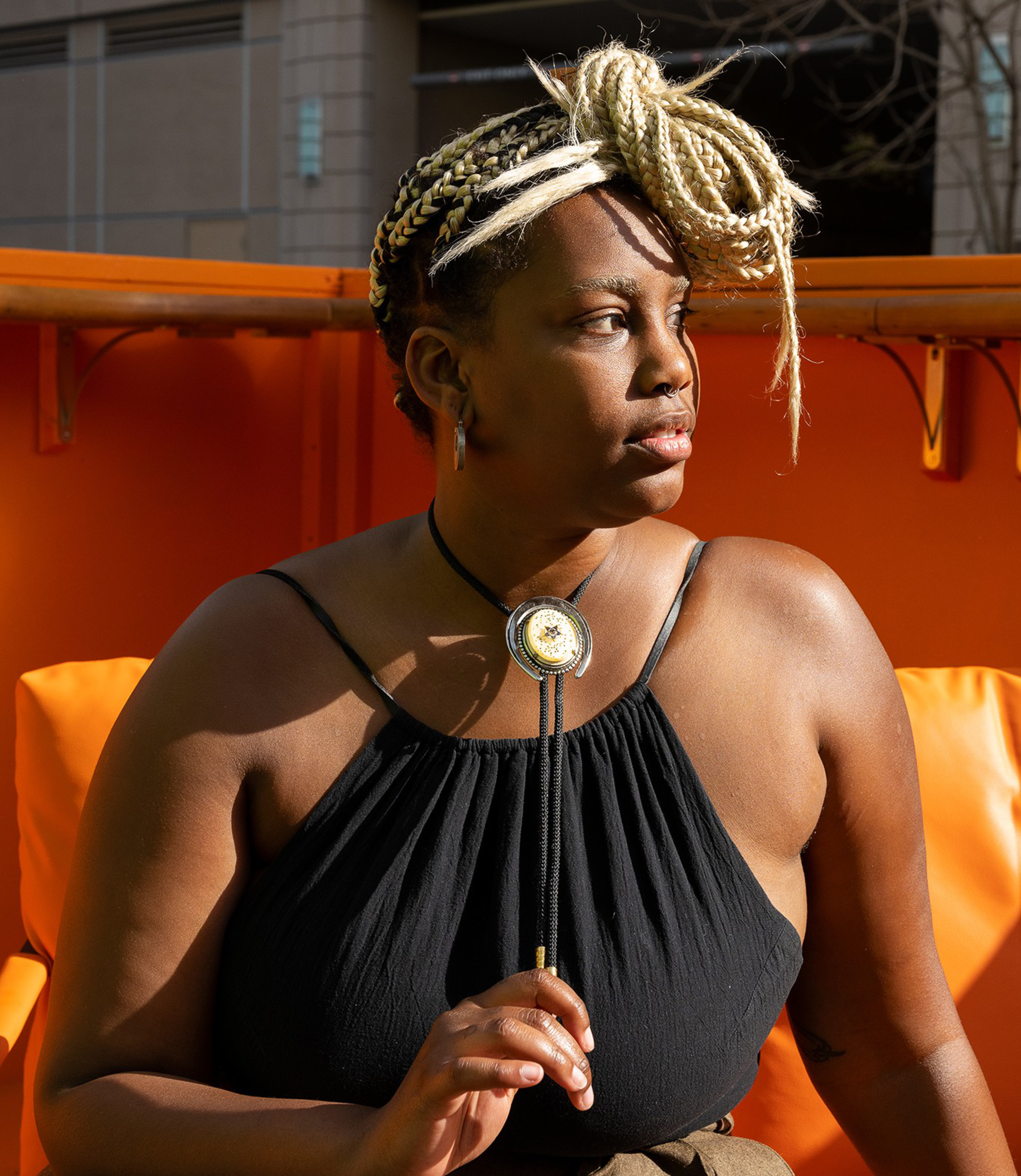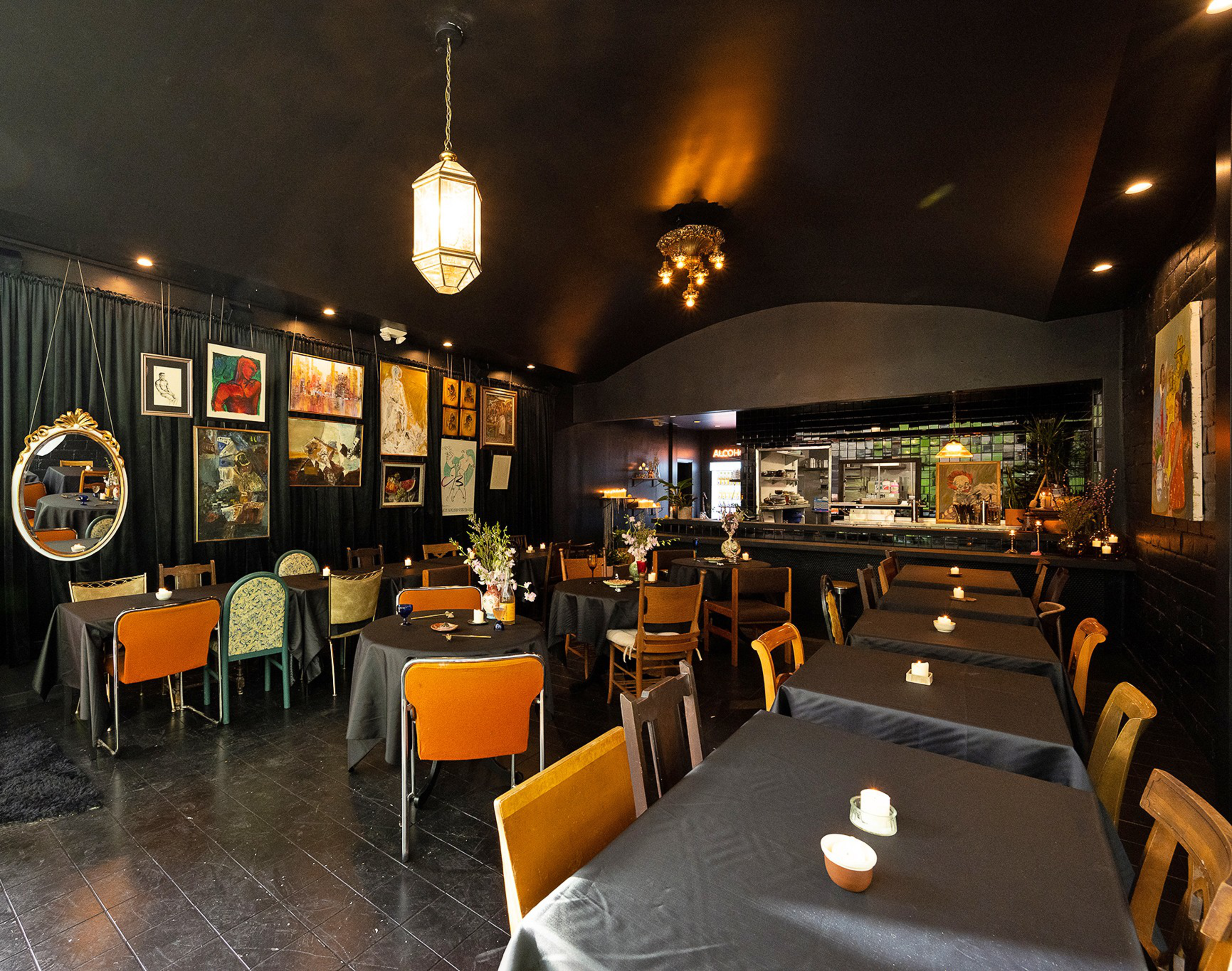When Hi Felicia opened in spring 2022, it appeared to be just the kind of place Downtown Oakland needed in the post-Covid era. A self-described “vulgar fine-dining” restaurant founded by a 25-year-old Black, queer woman chef named Imana, Hi Felicia was hailed as a breath of fresh air (opens in new tab), and its nine-course tasting menu earned positive early reviews. Imana, who goes by her first name only, made it clear from the start that she had set her sights on a Michelin star (opens in new tab).
The Los Angeles-born restaurateur had been running an extralegal and ultra-exclusive supper club out of her apartment; she transformed it into a brick-and-mortar dining room at 23rd and Webster streets.
Eater (opens in new tab) called Imana a “pandemic pop-up darling,” and SFGate (opens in new tab) made good on her request to list all her employees by name in a show of collectivism.
“My employees are the closest people to me on the planet,” Imana told SFGate.

Soon enough, it was tough to nab a reservation at Hi Felicia, and by November, the restaurant had secured a listing (opens in new tab) in the hallowed Michelin Guide.
So when Hi Felicia abruptly and permanently closed on May 24—just about a year after opening—something felt amiss, patrons said.
The closure, Imana said on Instagram, came the day after a burglary (opens in new tab) during which “our upstairs safe was thrown downstairs, glass door completely shattered, our cash register was broken.”
The Oakland Police Department confirmed that a burglary took place early in the morning on May 24 at Hi Felicia’s location.
But looking back on the past year, there were clues that not everything was going as planned.
The Standard spoke to two former employees who had quit weeks before the closure because they say Imana consistently mistreated them and failed to pay them on time.
“Checks were bouncing, and people were bouncing,” said Erica Castillo, a former cook at the restaurant.
These workers believe it was the steady outflow of employees—which began last fall—that led to Hi Felicia’s farewell.
Selasie Dotse served as Hi Felicia’s chef de cuisine from last July until resigning this April. The Ghanaian-born chef came to Imana’s kitchen after stints at other local fine-dining outfits, including Lazy Bear, Mourad and SPQR.

“When I left my last restaurant, I was trying to find a space that was safe for queer and Black and Brown people because we are underrepresented in fine dining,” they said.
Dotse realized, they said, that they wouldn’t find that safe space at Hi Felicia, mainly because of Imana’s mismanagement.
The winter after Dotse started at Hi Felicia, the two managers—Quin Kirwan and Emma Rasmussen—both left the restaurant.
Asked for comment, Imana told The Standard that Rasmussen had started as a manager, but by the time she left, it had become unfeasible to employ two managers.
Dotse said several other workers resigned after Imana agreed to have Hi Felicia as a featured restaurant in the VIP Tent at the Outside Lands festival in August 2022.
Castillo, an alum of posh Palo Alto bistro Bird Dog, was hired last December and also quit in early April—after barely four months on the job.
“It was falling apart,” she said. “All of this shit was happening, and the image that’s out there on [Hi Felicia’s] social media shows a very different experience.”

According to Dotse and Castillo, the kitchen staff often had to manage the front of the house because the dining room was understaffed or staff were undertrained for Hi Felicia’s multicourse format.
Imana did not directly address the reasons for the departures in her statement to The Standard.
“Of course, people quit for other reasons, outside opportunities, workplace indifferences, as happens at many restaurants,” she wrote.
Then there were the physical working conditions. Dotse told The Standard there was a roof leak in the kitchen that wasn’t fixed for months.
Imana said the kitchen leak was addressed, but that during the heavy rainy season, the staff was unable to use the flat-top range in the kitchen.

Dotse and Castillo said they also remember working in a freezing kitchen in beanies and hoodies because the restaurant didn’t have central heating. They said they repeatedly asked Imana to address the heating issue, but she never did.
“To say you want these Michelin standards but we don’t even have heat in the kitchen—it doesn’t work,” Dotse said.
Imana acknowledged that the kitchen was very cold over the winter. The landlord, she said, refused to take responsibility for heating.
The landlord did not respond to requests for comment in time for publication.
These issues seeped into Hi Felicia’s Yelp reviews (opens in new tab), which are a mixed bag. In February, a user named Ilona M. complained that the restaurant was “absolutely freezing.” While there are plenty of enthusiastic recommendations on Hi Felicia’s Yelp page, over the past few months, it received a slew of one-star reviews.
“Not worth the price of admission,” user Philamon H. wrote. “For a restaurant to ‘definitely aspire to Michelin-stardom,’ this is an embarrassing showing. The draconian reservation policy and abysmal turnout are the final nail in the coffin for me. Still gets a point for the ambiance and wine service. Don’t come here.”
Dotse also complained that Imana wasn’t in the kitchen often enough.

“I found it quite strange that she would never pick up a knife or really cook anything,” they said. “Usually, the executive chef is not necessarily in the kitchen all the time, but Imana was hardly ever there. She would show up for service some nights if we were really understaffed.”
Imana told The Standard that the restaurant typically had “almost eight people” in the kitchen and three people working front of house—all of whom were paid between $20 and $39 per hour.
“I should have been in [the] space more, but I was completely burnt out,” she wrote.
The understaffing issue was made more difficult, Dotse said, when Imana fell behind on invoices and bills, which ultimately trickled down to payroll. Dotse, Castillo and former dishwasher Niclas Haritos all said they had paychecks bounce more than once in February and March.
Imana told The Standard that she addressed the bounced paychecks—even sending advances on a couple of occasions—but that in some cases, the delay was due to her employees’ banks. She also shared email exchanges and screenshots among her then-employees and her bookkeeper about the paycheck issue.
After the third bounced check, Dotse said they sent their letter of resignation.
“I’m pretty loyal to a fault,” they said. “I can let a lot of things go, but when it comes to my money, that’s where I draw the line. Messing with my livelihood and how I pay my bills—it’s not a good look.”
Imana said that she had given Dotse a written warning about improving their performance and attitude last November, following up with a “final notice” email on Feb. 26. She shared their correspondence with The Standard.

Dotse, Castillo, Haritos and two other employees left Hi Felicia in March and April. Haritos told The Standard he quit on good terms to pursue another job opportunity.
“I am pretty good at adapting, and I usually focus on things I can control,” he said.
By May 1, Imana had announced that she was adding à la carte options, which made the restaurant more affordable.
In an interview with Resy (opens in new tab), Imana explained that the decision to switch to a hybrid menu was her way of staving off creative stagnation.
“Spring cleaning emotionally,” she told Resy. “I want to reach more people. I want more people to be able to experience the magic we are creating.”
In her email statement, Imana addressed the decision to go à la carte and its connection to the restaurant’s ultimate closure.
“That was the worst pivot that I made,” she wrote. “I have been thinking for almost the entirety of the year about if I even wanted to stay open. I did à la carte for three weeks before I started having personal conversations with loved ones about not wanting to do Hi Felicia anymore, and struggling with what that looked like, and where to even start.”
Castillo told The Standard she believes that choice was the direct result of losing so many kitchen staffers in a short time. In this way, the decision to close was a natural extension of the restaurant’s ongoing issues.
“She was already planning to change the business, and the burglary just catapulted it,” Castillo said.

Imana said that while five people left Hi Felicia in March and April, she employed nine people at the restaurant during her last month in business.
“I want to make it very clear, closing was my own personal decision,” she said—emphasizing that Hi Felicia’s shuttering was not connected to employee turnover.
Indeed, two days before the closure, a picture of the 14-foot communal table from Hi Felicia’s dining room surfaced in a Craigslist posting (opens in new tab) that offered it up for $5,000.
In her closing announcement on Instagram, Imana wrote that she would be opening a “sleek & sexy wine bar” in Hi Felicia’s place. Those who have frequented Imana’s second business, Sluts the Wine Bar in SoMa in San Francisco, are left wondering whether Hi Felicia’s reincarnation will serve the same puzzling selection of bar bites. A recent food menu from Sluts outlined such offerings as turkey and cheese Lunchables and Eggo waffles—items that certainly wouldn’t require a team of Michelin-rated chefs.

At publication time, all of the posts on Hi Felicia’s Instagram posts have been deleted save for Imana’s May 24 announcement about the closure. The name on the account was changed to “Circus.”
Castillo and Dotse both expressed their regrets for how they left the restaurant but said they felt it necessary to cut ties with Imana.
“At the end of the day, she’s out for herself,” Castillo said.
“I wanted it to be for us, by us,” Dotse added. “As much as I wanted to cultivate that, if the boss doesn’t necessarily share those viewpoints, that’s hard to do.”
Imana framed things differently.
“It didn’t work out on all ends for a lot of reasons,” she wrote. “It is a hard chapter for me to end, but it has been very freeing, and allowed me to spend time on other projects. I learned what I do and do not want in a business, and I am grateful for these lessons learned. I will take this moment, publicly, to apologize for actions that made my team feel upset and uncomfortable.”
